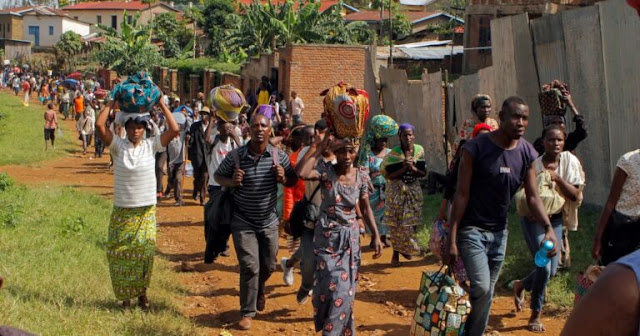In a significant development for regional stability in Central Africa, the Democratic Republic of the Congo (DRC) and Rwanda have initiated concrete measures to facilitate the voluntary repatriation of refugees, marking a pivotal step toward addressing one of the continent’s most protracted humanitarian crises. The United Nations High Commissioner for Refugees (UNHCR) has confirmed that approximately 600 Rwandan refugees living in the DRC have recently returned to their home country under a newly formalized tripartite agreement involving Rwanda, the DRC, and the UNHCR. This milestone follows high-level discussions in Kinshasa between UNHCR chief Filippo Grandi and DRC President Félix Tshisekedi, which focused on advancing joint commitments to support refugees and internally displaced persons (IDPs) in the region.
The repatriation effort is part of a broader roadmap endorsed in July 2025 by the DRC, Rwanda, and the UNHCR, which outlines a framework for the voluntary, safe, and dignified return of refugees between 2025 and 2026. The agreement represents a rare moment of cooperation between the two neighboring countries, whose relations have historically been strained by conflict, mistrust, and cross-border displacement. However, the ongoing armed conflict in eastern DRC, where over 260 armed groups remain active, continues to pose significant challenges to the success of these efforts. The UNHCR has called for increased international support to address the humanitarian crisis and ensure that political commitments translate into tangible benefits for those affected by displacement.
The DRC is one of the world’s largest hosts of refugees and IDPs, with over 515,000 refugees, including more than 200,000 Rwandans, and nearly six million IDPs, the second-highest figure in Africa after Sudan. At the same time, over 1.2 million Congolese nationals live as refugees in neighboring countries, with nearly 79,000 residing in Rwanda. The repatriation agreement is a critical step toward addressing this complex web of displacement, but its success hinges on sustained political will, regional cooperation, and international funding to tackle the root causes of conflict and insecurity in the region.
The Historical Context of Displacement in the DRC and Rwanda
The refugee and IDP crisis in the DRC and Rwanda is deeply rooted in the region’s turbulent history, marked by decades of conflict, political instability, and ethnic tensions. The 1994 Rwandan Genocide, in which over 800,000 people were killed, triggered one of the largest refugee crises in modern history, with millions of Rwandans fleeing to neighboring countries, particularly the DRC (then Zaire). The influx of refugees, including perpetrators of the genocide, destabilized eastern DRC, contributing to the First and Second Congo Wars (1996–1997 and 1998–2003), which involved multiple regional actors and resulted in millions of deaths and widespread displacement.
The legacy of these conflicts continues to shape the region’s humanitarian landscape. Eastern DRC, particularly the provinces of North Kivu, South Kivu, and Ituri, remains a hotspot for violence, with over 260 armed groups, including the M23 rebel movement, the Allied Democratic Forces (ADF), and various local militias, perpetuating insecurity. These groups are often fueled by competition over natural resources, ethnic rivalries, and external interference, creating a vicious cycle of displacement and suffering.
Rwanda, while achieving remarkable stability and economic growth under President Paul Kagame, continues to grapple with the challenges of reintegrating returnees and addressing the concerns of its diaspora. The presence of Rwandan refugees in the DRC, many of whom fled during or after the genocide, has been a source of tension between the two countries. Rwanda has accused the DRC of harboring armed groups, such as the Democratic Forces for the Liberation of Rwanda (FDLR), which include former genocide perpetrators, while the DRC has accused Rwanda of supporting rebel groups like M23, allegations that Kigali denies.
The tripartite agreement represents a significant effort to break this cycle of mistrust and displacement. By facilitating the voluntary repatriation of Rwandan refugees, the DRC and Rwanda are signaling a willingness to address shared challenges through dialogue and cooperation. The agreement also includes provisions for the repatriation of Congolese refugees from Rwanda, creating a reciprocal framework for addressing cross-border displacement.
Details of the Repatriation Agreement
The tripartite agreement, endorsed in July 2025, outlines a roadmap for the voluntary, safe, and dignified return of refugees between the DRC and Rwanda over a two-year period (2025–2026). The agreement is grounded in international refugee law, particularly the principles of non-refoulement (ensuring refugees are not forcibly returned to places where they face persecution) and voluntary repatriation. The UNHCR plays a central role in coordinating the process, providing logistical support, and ensuring that returnees are reintegrated into their communities with dignity.
According to the UNHCR, approximately 600 Rwandan refugees have already been repatriated from the DRC in recent days, marking the initial phase of the agreement’s implementation. These returnees, who were living in refugee camps and host communities in eastern DRC, underwent a voluntary registration process to confirm their willingness to return. The UNHCR, in collaboration with the DRC and Rwandan governments, provided transportation, basic necessities, and reintegration assistance, including access to housing, healthcare, and livelihood opportunities.
The agreement also addresses the needs of Congolese refugees in Rwanda, with nearly 79,000 Congolese nationals currently residing in camps such as Kiziba and Gihembe. The roadmap includes plans for their gradual return to the DRC, contingent on improved security conditions in their home regions. The UNHCR is working with both governments to conduct assessments, engage with refugee communities, and develop reintegration programs that address the unique challenges faced by returnees, such as land disputes, economic hardship, and social reintegration.
The Humanitarian Crisis in the DRC
The DRC’s humanitarian crisis is one of the most complex and protracted in the world. With over 515,000 refugees and nearly six million IDPs, the country faces immense challenges in providing shelter, food, healthcare, and security for its displaced populations. The majority of IDPs are concentrated in eastern DRC, where ongoing conflict has displaced entire communities, disrupted livelihoods, and exacerbated poverty. Women and children, who make up a significant portion of the displaced population, are particularly vulnerable to gender-based violence, malnutrition, and lack of access to education.
The presence of over 260 armed groups in eastern DRC is a major driver of displacement. These groups, ranging from small militias to well-organized rebel movements, engage in violence against civilians, compete for control of mineral-rich areas, and undermine efforts to establish peace. The M23 rebellion, which resurfaced in 2021, has displaced hundreds of thousands of people in North Kivu, while groups like the ADF, linked to the Islamic State, have carried out deadly attacks in Ituri and North Kivu. The resulting insecurity has made it difficult for humanitarian organizations to deliver aid and for displaced persons to return to their homes.
The UNHCR’s Filippo Grandi, during his meeting with President Tshisekedi in Kinshasa, emphasized the need for political solutions to address the root causes of conflict and displacement. “Political initiatives must now translate into concrete benefits for people trapped in conflict situations, including refugees and internally displaced persons,” he said. Grandi’s remarks underscore the interconnectedness of peacebuilding, humanitarian assistance, and refugee repatriation, highlighting the need for a holistic approach to the crisis.
Challenges to Repatriation and Regional Stability
While the tripartite agreement is a promising step, its implementation faces significant challenges. The ongoing conflict in eastern DRC remains the most formidable obstacle, as insecurity prevents many refugees and IDPs from returning to their homes. The presence of armed groups, coupled with allegations of external support for rebel movements, continues to strain relations between the DRC and Rwanda, complicating efforts to sustain cooperation.
Security concerns also affect the safety of returnees. Rwandan refugees in the DRC, particularly those associated with the 1994 genocide, may fear persecution or retaliation upon their return. Similarly, Congolese refugees in Rwanda may be hesitant to return to areas still affected by violence or lacking basic services. The UNHCR has emphasized that repatriation must be voluntary and conducted in accordance with international standards, with robust monitoring mechanisms to ensure the safety and dignity of returnees.
Economic and social reintegration poses another challenge. Many returnees face difficulties accessing land, housing, and employment, particularly in regions affected by conflict or resource scarcity. In Rwanda, the government has made strides in providing reintegration support, including vocational training and microfinance programs, but the scale of the refugee population requires sustained investment. In the DRC, the government’s capacity to support returnees is limited by resource constraints and competing priorities, necessitating greater international assistance.
The financial burden of addressing the refugee and IDP crisis is immense. The UNHCR and other humanitarian organizations rely heavily on international donors to fund their operations, but funding shortfalls have hampered their ability to meet growing needs. In 2024, the UNHCR’s appeal for the DRC was only 40% funded, leaving millions of displaced persons without adequate support. Grandi’s call for greater donor support reflects the urgent need for increased financial commitments to sustain repatriation efforts and address the broader humanitarian crisis.
The Role of International Cooperation
The tripartite agreement between the DRC, Rwanda, and the UNHCR is a testament to the importance of international cooperation in addressing complex humanitarian challenges. The UNHCR’s role as a mediator and coordinator has been critical in facilitating dialogue between the two countries and ensuring that repatriation efforts adhere to international standards. The organization’s expertise in refugee protection, logistics, and reintegration has been instrumental in the initial success of the agreement, with 600 Rwandan refugees already repatriated.
International donors, including countries like the United States, the European Union, and Japan, play a vital role in supporting the UNHCR’s operations in the region. However, the scale of the crisis requires a broader coalition of partners, including regional organizations like the African Union (AU) and the East African Community (EAC). The AU’s Great Lakes Region Peace and Security Framework, which includes initiatives to address conflict and displacement, could provide a platform for mobilizing regional support for the repatriation agreement.
China, a growing player in African development, has also expressed interest in supporting humanitarian efforts in the DRC. Recent Chinese investments in infrastructure and mining in the DRC could be leveraged to support peacebuilding and development initiatives that address the root causes of displacement. Similarly, Brazil, with its expertise in conflict resolution and humanitarian assistance, could play a role in supporting regional stability through South-South cooperation.
Implications for Regional Stability and Development
The repatriation agreement has significant implications for regional stability in Central Africa. By addressing the refugee crisis, the DRC and Rwanda are taking steps to reduce tensions and build trust, which could pave the way for broader cooperation on issues such as trade, security, and resource management. The agreement also sends a positive signal to other countries in the Great Lakes region, where millions of refugees and IDPs remain displaced due to conflict and instability.
Successful repatriation could have a transformative impact on the DRC and Rwanda’s economies and societies. In Rwanda, the return of refugees could contribute to economic growth by expanding the labor force and fostering social cohesion. In the DRC, the repatriation of Congolese refugees and the stabilization of IDP populations could free up resources for development projects, such as infrastructure, healthcare, and education. However, these benefits will only be realized if the root causes of conflict and displacement are addressed through sustained political and diplomatic efforts.
The agreement also aligns with broader global priorities, including the UN’s Sustainable Development Goals (SDGs), particularly SDG 16 (Peace, Justice, and Strong Institutions). By promoting peace and stability, the repatriation effort contributes to creating conditions for sustainable development, poverty reduction, and social inclusion. The involvement of the UNHCR ensures that the process adheres to international humanitarian standards, providing a model for other regions grappling with displacement.
The Path Forward
The repatriation of 600 Rwandan refugees is a promising start, but it is only the beginning of a long and complex process. The DRC and Rwanda must sustain their commitment to the tripartite agreement, working closely with the UNHCR to expand repatriation efforts and address the needs of both refugees and IDPs. This will require ongoing dialogue to resolve tensions, strengthen security, and build confidence among returnees.
The international community has a critical role to play in supporting these efforts. Increased funding for humanitarian programs, technical assistance for reintegration, and diplomatic support for peacebuilding initiatives are essential to ensuring the success of the agreement. Regional organizations, such as the AU and the EAC, can also contribute by facilitating dialogue and promoting cross-border cooperation.
For the DRC, addressing the root causes of conflict in the east is paramount. This includes disarming and demobilizing armed groups, addressing resource conflicts, and strengthening governance in affected regions. Rwanda, for its part, must continue to create conditions for the safe and dignified return of its citizens, including addressing concerns about persecution and ensuring access to basic services.
The voices of refugees and IDPs must also be central to the process. Community engagement, including consultations with refugee leaders and local authorities, will be critical to ensuring that repatriation efforts are inclusive and responsive to the needs of those affected. Women, children, and other vulnerable groups must be prioritized to ensure that their rights and dignity are protected.
A Call for Hope and Action
The tripartite agreement between the DRC, Rwanda, and the UNHCR is a beacon of hope in a region long plagued by conflict and displacement. The repatriation of 600 Rwandan refugees is a tangible step toward addressing one of the world’s most pressing humanitarian crises, demonstrating the power of cooperation and compassion in the face of adversity. However, the road ahead is fraught with challenges, and the success of the agreement will depend on sustained political will, regional collaboration, and international support.
As Filippo Grandi emphasized, political initiatives must translate into concrete benefits for those trapped in conflict and displacement. The DRC and Rwanda, with the support of the UNHCR and the international community, have an opportunity to set a precedent for addressing refugee crises through dialogue, trust-building, and shared responsibility. By working together, they can create a future where refugees and IDPs can return home with dignity, rebuild their lives, and contribute to the development of their communities.
The journey toward lasting solutions will not be easy, but the initial steps taken by the DRC and Rwanda offer a glimmer of hope. As the two countries move forward with the repatriation roadmap, they have the chance to rewrite the narrative of the Great Lakes region, transforming it from a region defined by conflict and displacement to one characterized by peace, resilience, and opportunity.






